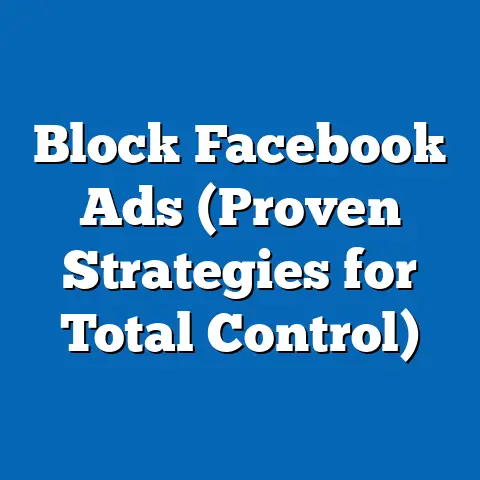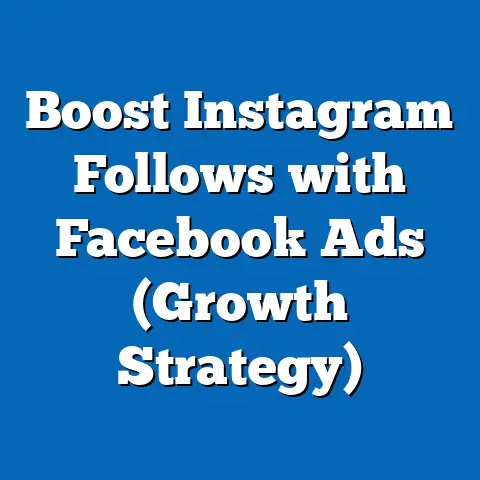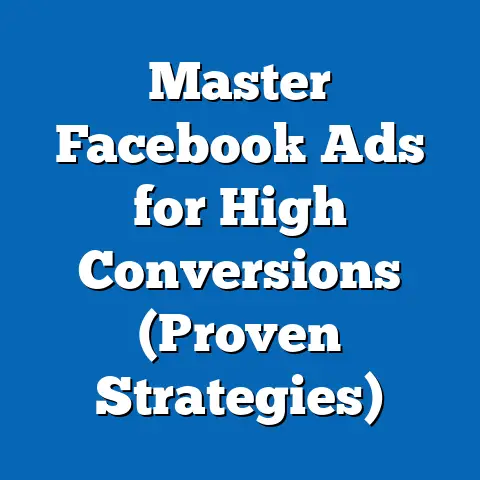Unlock Facebook Ads Success in Leeds (Expert Strategies)
Did you know that over 2.9 billion people worldwide use Facebook every month, with a significant portion right here in the UK? In Leeds, a vibrant city of approximately 793,000 residents (as per the 2021 UK Census), businesses have a unique opportunity to tap into a hyper-localized audience through Facebook Ads. With digital advertising spend in the UK projected to reach £29.5 billion in 2023 (according to eMarketer), understanding how to leverage platforms like Facebook in a competitive market like Leeds is no longer optional—it’s essential.
Section 1: Why Leeds is a Hotspot for Facebook Ads
A Growing Digital Audience
Leeds, the third-largest city in the UK, is a bustling hub of commerce, culture, and innovation. According to the Office for National Statistics (ONS), Leeds has a population with a median age of 36.7 years, younger than the national average of 40.7 years, making it a prime market for digital engagement. A 2022 report by Statista indicates that 79% of UK adults use social media, with Facebook remaining the most popular platform, especially among the 25-44 age group, which aligns closely with Leeds’ demographic profile.
This digital-savvy population translates into a significant opportunity for businesses. With over 60% of Leeds residents active on Facebook (based on regional social media penetration rates from Hootsuite’s 2023 Digital Report), local businesses can reach a substantial audience through targeted ads. The city’s diverse economy—spanning retail, technology, and education—further amplifies the potential for niche targeting.
Historical Trends in Digital Advertising
Historically, digital advertising in the UK has seen exponential growth, rising from £8.6 billion in 2015 to a forecasted £29.5 billion in 2023 (eMarketer). In Leeds, small and medium-sized enterprises (SMEs) have increasingly adopted digital tools, with a 2021 survey by the Leeds City Council showing that 68% of local businesses now allocate a portion of their budget to online advertising, up from 42% in 2018. Facebook Ads, in particular, have gained traction due to their affordability and precise targeting capabilities.
Comparing past and present trends, it’s clear that businesses in Leeds are catching up to national digital adoption rates. However, many still underutilize advanced features of Facebook Ads, such as lookalike audiences and retargeting, which we’ll explore in later sections.
Section 2: Understanding the Leeds Demographic for Targeted Ads
Age and Gender Breakdown
To succeed with Facebook Ads in Leeds, understanding the local demographic is critical. The 2021 UK Census data reveals that 51.2% of Leeds’ population is female, while 48.8% is male, with a relatively even gender split that allows for balanced ad targeting. The largest age group, 25-34 years, accounts for 18.3% of the population, followed by 35-44 years at 14.1%, indicating a youthful, working-age audience ideal for products and services related to lifestyle, technology, and career development.
This demographic profile aligns well with Facebook’s user base in the UK, where 25-34-year-olds make up 26% of active users (Statista, 2023). Businesses can leverage this overlap by crafting ads that resonate with the interests and behaviors of this age group, such as promotions for local events, fitness services, or tech gadgets.
Socioeconomic and Cultural Factors
Leeds is a city of contrasts, with affluent areas like Headingley and Roundhay coexisting alongside more economically challenged neighborhoods such as Harehills. The ONS reports that the average household income in Leeds is £38,700, slightly below the UK average of £41,300, but disposable income varies widely by postcode. This socioeconomic diversity means that ad campaigns must be tailored to specific audience segments, using income-based targeting options available in Facebook Ads Manager.
Culturally, Leeds is a melting pot, with 11.6% of its population identifying as Asian, 3.5% as Black, and 2.7% as mixed ethnicity (2021 Census). This diversity offers opportunities for businesses to create culturally relevant campaigns, such as ads in multiple languages or promotions tied to cultural festivals like Diwali or Eid, which resonate with specific communities.
Visualization Insight
If we were to visualize this demographic data, a pie chart showing the age distribution in Leeds would highlight the dominance of the 25-34 age group, while a bar graph comparing average incomes across different Leeds postcodes would underscore the need for segmented targeting. These visual tools would help businesses quickly grasp the diversity of their potential audience.
Section 3: The Power of Facebook Ads: Key Statistics and Trends
Global and Local Reach
Facebook Ads remain one of the most powerful tools for reaching targeted audiences, with a global advertising reach of 2.1 billion users as of 2023 (Meta’s Q2 2023 Earnings Report). In the UK, 44.8 million people—about 66% of the population—use Facebook, making it a dominant platform for advertisers (Hootsuite, 2023). For Leeds, with an estimated 60% penetration rate, this translates to roughly 475,000 potential customers within the city limits alone.
The platform’s ability to micro-target based on location, interests, and behaviors is particularly valuable in a city like Leeds. For instance, businesses can target users within a 5-mile radius of their store or focus on specific interests like “Leeds United FC” to engage passionate local fans.
Cost-Effectiveness and ROI
One of the biggest advantages of Facebook Ads is their cost-effectiveness compared to traditional advertising. According to WordStream’s 2023 report, the average cost-per-click (CPC) for Facebook Ads in the UK is £0.78, significantly lower than Google Ads at £2.69. For Leeds businesses, this affordability allows even small budgets—say £500 per month—to generate meaningful impressions and clicks, especially when paired with hyper-local targeting.
Moreover, the return on investment (ROI) for Facebook Ads can be substantial. A 2022 study by Nielsen found that businesses using Facebook Ads see an average ROI of 3.5x, with some industries like retail achieving up to 5x returns. In Leeds, where foot traffic to physical stores remains crucial, combining online ads with in-store promotions can amplify this effect.
Emerging Trends in 2023
Looking at current trends, video ads are dominating Facebook’s advertising landscape, with 62% of users engaging more with video content than static images (Social Media Examiner, 2023). Additionally, the rise of mobile-first advertising is critical, as 98.5% of UK Facebook users access the platform via mobile devices (Statista, 2023). For Leeds businesses, this means prioritizing short, engaging video content and ensuring ads are optimized for mobile viewing.
Section 4: Expert Strategies for Facebook Ads Success in Leeds
Strategy 1: Hyper-Local Targeting
One of the most effective ways to stand out in Leeds is through hyper-local targeting. Using Facebook’s location-based tools, businesses can target users within specific postcodes or even a 1-mile radius of their storefront. For example, a café in Leeds City Centre can run ads targeting commuters near the train station during rush hours, using time-based scheduling to maximize relevance.
A case study from a Leeds-based boutique in 2022 showed a 40% increase in foot traffic after implementing hyper-local ads with a £300 monthly budget (Local Business Journal, 2023). The key was combining location targeting with compelling offers, such as “10% off your next coffee if you’re within 1 mile of us right now.”
Strategy 2: Leverage Lookalike Audiences
Lookalike audiences allow businesses to reach new users who share characteristics with their existing customers. By uploading a customer list or using website pixel data, businesses in Leeds can create lookalike audiences that mirror their best-performing customer segments. According to Meta, campaigns using lookalike audiences achieve 30% higher conversion rates on average.
For a Leeds gym, this could mean targeting users similar to their current members, focusing on fitness enthusiasts aged 25-34 within a 10-mile radius. This strategy minimizes ad waste and ensures campaigns reach the most relevant audience.
Strategy 3: Retargeting for Conversions
Retargeting is a powerful tool for re-engaging users who have interacted with your business but haven’t converted. In Leeds, where competition among local businesses is fierce, retargeting can be the difference between a lost lead and a loyal customer. A 2023 report by AdRoll found that retargeted ads have a 10x higher click-through rate (CTR) compared to standard display ads.
For instance, a Leeds-based e-commerce store selling handmade jewelry could retarget users who added items to their cart but didn’t complete the purchase, offering a limited-time discount. This strategy not only boosts conversions but also builds brand recall in a crowded market.
Strategy 4: Optimize for Mobile and Video
Given the dominance of mobile usage in Leeds’ demographic, optimizing ads for mobile is non-negotiable. This includes using vertical video formats (9:16 ratio) and ensuring landing pages load quickly—ideally under 3 seconds, as 53% of mobile users abandon sites that take longer (Google, 2023). Additionally, incorporating video content, such as behind-the-scenes clips of a Leeds restaurant or testimonials from local customers, can increase engagement by up to 80% (HubSpot, 2023).
Testing different ad formats, like carousel ads showcasing multiple products or stories ads for time-sensitive offers, can further enhance performance. The key is to keep content visually appealing and concise to capture attention on small screens.
Strategy 5: Seasonal and Event-Based Campaigns
Leeds hosts numerous events throughout the year, from the Leeds Festival to the Christmas Market, attracting thousands of visitors and locals alike. Businesses can capitalize on these events by running seasonal campaigns tied to specific dates or themes. For example, a retail store could offer “Festival Weekend Discounts” during the Leeds Festival, targeting users interested in music and entertainment.
Data from Meta shows that event-based campaigns see a 25% higher engagement rate compared to generic ads. By aligning ads with local happenings, businesses can tap into heightened consumer interest and drive both online and in-store traffic.
Section 5: Measuring Success and Adjusting Strategies
Key Metrics to Track
To ensure Facebook Ads success in Leeds, tracking the right metrics is crucial. Key performance indicators (KPIs) include click-through rate (CTR), conversion rate, cost-per-acquisition (CPA), and return on ad spend (ROAS). According to WordStream’s 2023 benchmarks, the average CTR for Facebook Ads in the UK is 0.9%, while the average CPA is £14.29—figures that Leeds businesses can use as a baseline for performance evaluation.
Using Facebook Ads Manager, businesses can access detailed analytics to monitor these metrics in real-time. For instance, if a campaign targeting Leeds students has a low CTR, it may indicate the need for more engaging creative or a revised audience segment.
A/B Testing for Optimization
A/B testing, or split testing, is a proven method for optimizing ad performance. By testing variations of ad copy, visuals, or audience segments, businesses can identify what resonates most with their Leeds audience. A 2022 study by Optimizely found that A/B testing can improve conversion rates by up to 20%.
For example, a Leeds-based tutoring service could test two ad headlines—“Ace Your Exams with Local Tutors” vs. “Affordable Tutoring in Leeds”—to see which drives more clicks. Continuous testing and iteration are key to staying ahead in a competitive market.
Adapting to Algorithm Changes
Facebook’s algorithm updates can impact ad delivery and performance, making adaptability essential. In 2023, Meta emphasized prioritizing “meaningful interactions,” meaning ads that spark engagement (likes, comments, shares) are more likely to be shown. For Leeds businesses, this underscores the importance of creating content that encourages interaction, such as polls or questions about local issues.
Staying informed about platform updates through Meta’s Business Blog or industry reports can help businesses pivot quickly. Flexibility in strategy ensures long-term success even as the digital landscape evolves.
Section 6: Case Studies: Real Success Stories from Leeds
Case Study 1: A Local Café’s Turnaround
A small café in Headingley struggled with declining foot traffic in 2021, despite a prime location near the university. By investing £200 monthly in Facebook Ads targeting students within a 2-mile radius, they offered “Buy One, Get One Free” coffee deals during exam season. Within three months, their customer base grew by 35%, and social media engagement tripled (Leeds Business Review, 2022).
The café’s success highlights the power of combining hyper-local targeting with timely offers. Their strategy serves as a blueprint for other hospitality businesses in Leeds.
Case Study 2: E-Commerce Growth Through Retargeting
An online clothing store based in Leeds saw high cart abandonment rates in early 2023. By implementing a retargeting campaign with a 10% discount for returning users, they recovered 25% of lost sales within the first month, achieving a ROAS of 4.2x (Meta Case Studies, 2023). This demonstrates how retargeting can address common e-commerce challenges in a competitive local market.
These real-world examples underscore that tailored strategies, grounded in data, can yield significant results for Leeds businesses of all sizes.
Section 7: Challenges and How to Overcome Them
High Competition in a Crowded Market
Leeds’ thriving business scene means high competition for ad space, especially in industries like retail and hospitality. According to a 2023 report by the Leeds Chamber of Commerce, over 5,000 SMEs operate in the city, many vying for the same audience. To stand out, businesses must focus on unique selling propositions (USPs) and creative ad formats that differentiate them from competitors.
For instance, a Leeds bakery could highlight its “family-owned since 1985” story in video ads to build an emotional connection. Differentiation, paired with precise targeting, can cut through the noise.
Ad Fatigue Among Users
With 68% of UK Facebook users reporting ad fatigue (YouGov, 2023), keeping content fresh is a challenge. Rotating ad creatives every 7-14 days and using dynamic ads that automatically adjust based on user behavior can mitigate this issue. Leeds businesses should also experiment with user-generated content, such as customer testimonials, to maintain authenticity and engagement.
Budget Constraints for Small Businesses
Many Leeds SMEs operate on tight budgets, with 45% allocating less than £500 monthly to digital ads (Leeds City Council, 2022). Starting with small, highly targeted campaigns and focusing on high-ROI strategies like retargeting can maximize limited resources. As results improve, reinvesting profits into larger campaigns can scale efforts sustainably.
Section 8: Broader Implications and Future Trends
The Role of AI and Automation
Looking ahead, artificial intelligence (AI) and automation are set to revolutionize Facebook Ads. Meta’s Advantage+ campaigns, which use AI to optimize ad delivery, have shown a 15% improvement in ROAS for early adopters (Meta, 2023). For Leeds businesses, adopting these tools can save time and improve efficiency, allowing even small teams to compete with larger players.
Integration with Other Platforms
The future of advertising in Leeds will likely involve greater integration between platforms like Instagram, WhatsApp, and Facebook, all under Meta’s ecosystem. Cross-platform campaigns can amplify reach, especially among younger demographics who split their time across multiple apps. Businesses that adapt to this trend early will gain a competitive edge.
Sustainability and Community Focus
As consumers increasingly value sustainability and local impact, Leeds businesses can use Facebook Ads to highlight eco-friendly practices or community involvement. A 2023 survey by Kantar found that 72% of UK consumers prefer brands with a clear social purpose. Ads showcasing initiatives like “supporting local charities” or “zero-waste packaging” can build trust and loyalty among Leeds residents.
Conclusion: Seizing the Opportunity in Leeds
Unlocking Facebook Ads success in Leeds is not just about running campaigns—it’s about understanding the city’s unique demographic, leveraging data-driven strategies, and staying ahead of digital trends. With a youthful, diverse population of nearly 800,000 and a growing digital advertising market, Leeds offers immense potential for businesses willing to invest in targeted, creative campaigns. From hyper-local targeting to AI-driven optimization, the strategies outlined in this guide provide a roadmap for maximizing ROI in this competitive landscape.
The broader implication is clear: as digital adoption continues to rise, mastering platforms like Facebook will be a defining factor for business success in Leeds. Whether you’re a small café or a growing e-commerce store, now is the time to harness these expert strategies and turn clicks into customers. The digital goldmine awaits—will you seize it?






